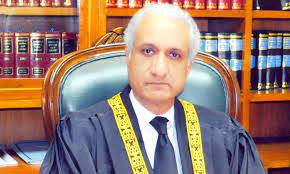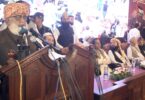F.P. Report
ISLAMABAD: In a rare development, the Supreme Court’s second senior-most judge after the incumbent chief justice, Ijaz Ul Ahsan, resigned on Thursday. Ahsan, who would become the next chief justice of Pakistan after incumbent CJP Qazi Faez Isa, has sent his resignation to President Arif Alvi, raising questions over his untimely departure.
The major event comes within a day of Justice (retd) Sayyed Mazahar Ali Akbar Naqvi’s resignation, which has also been accepted by the president today. Ahsan would have become the chief justice — the highest judicial office in the country that comes with supreme power — after CJP Isa’s term concluded in October this year as Justice Tariq Masood, the senior puisne judge, would hang his robes before that.
In his resignation to the president, Ahsan said he no longer wished to continue as the top court’s judge, therefore, he was resigning under Article 206(1) of the Constitution with immediate effect. Both the judges were considered ‘close’ to former CJP Umar Ata Bandial, with analysts saying that the jurists were involved in issuing controversial orders — along with another judge, Justice Munib Akhtar. While Bandial was in office, the fault lines between the top court’s judges were visible. This trend diminished when CJP Isa came to the helm, but the damage had already been done.
In April last year, a lawyer filed a reference before the Supreme Judicial Council (SJC) against then-CJP Bandial and three other judges — Justice Ahsan, Justice Akhtar, and Justice Naqvi. The complainant based his reference on an alleged violation of the Code of Conduct for judges of the superior judiciary issued by the SJC on September 2, 2009.
Born in 1960, Ahsan began his legal career in the 1980s. He was confirmed as a judge of the Lahore High Court on May 11, 2009, and became the LHC’s CJ on November 6, 2015. He was elevated to the Supreme Court on June 28, 2016, less than a year after serving as the LHC’s top judge. It is important to note that he was part of the infamous Panama Papers bench that disqualified Pakistan Muslim League-Nawaz (PML-N) supremo Nawaz Sharif.
He was also appointed to oversee proceedings of the references that the NAB has been asked to file — by the top court — against Nawaz, his family members, and former finance minister Ishaq Dar. Also, in 2018, Ahsan was part of the five-member bench that had ruled that disqualification under Article 62(1)(f) was “permanent”. Then, he was also part of the bench that ruled that if a person is disqualified, then they cannot even head a political party.
When the matter of no-confidence against former prime minister Imran Khan was in the running, a petition was filed for the interpretation of Article 63-A — whether the votes of party lines will be counted or not. He was part of that bench as well, which ruled that voting against party lines would not be counted, benefiting the Pakistan Tehreek-e-Insaf (PTI). Last year, during the Pakistan Democratic Movement’s (PDM) government, the Supreme Court would intervene when the parliament would pass laws. In majority of those benches, Ahsan was included. In terms of NAB laws, Ahsan had struck them down. “His jurisprudence has always remained controversial.







